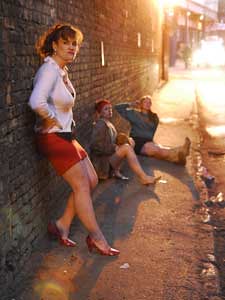By Natalie Bennett
If “every unhappy family is unhappy in its own way”, then is every unhappy category of people unhappy in their own way? It would seem not, if Alexander Galin’s account of the lives of Russian street prostitutes, Stars in the Morning Sky, is to be believed. The stories of Anna, Maria, Klara and Laura are achingly similar to those we heard in so much detail recently in Britain after the Ipswich murders.
They are victims of poor parenting, of institutional abuse, of exploitation by “boyfriends”, of drug addiction. They survive, and keep themselves going, through a mixture of hard-headed calculation, mad dreams, fairy tales that they half-believe, and sometimes pure panic that matches accounts from British social workers of the lives of the women they try to help.
But there’s no helpful, friendly institutional figures in Eighties Russia – just the rough, much-exploited Valentina (Jan Hirst), half-hostess, half-jailer, whose unreliable policeman son Nikolai (Sean Hammond) is the only indicator of genuine authority, and an unimpressive one. The “working” women have been forced out of Moscow in the clean-up preceding the 1980 Moscow Olympics. That’s one thing that makes this production of Stars in the Morning Sky, the first, it is said, in translation, topical – no doubt a similar set of Chinese women are soon to endure similar treatment.
Laura (Cassie Raine – you might recognise her from the BBC’s Casualty) is the central character; her essential survival fantasy is that she’s a trapeze artist, daughter of an aristocratic woman who fell for a circus juggler. She loves, she declares, “beauty”, and she clings desperately to her idea of beauty in speech, dress and behaviour, even when about to fuck an escaped asylum-inmate Alexander (William McGeogh), who might, or more probably might not, be a Nobel prize-winning physicist. Not for money – but to make sure he doesn’t leave her alone: the mere thought of this fate makes her frantic.
The women have few dreams, but still occasional, mad hopes – they glimpse in the distance gleams of light, of hope, and utterly misinterpret them. Laura sees a signal rocket and believes it is Venus; Maria, the abused 15-year-old, (played with dreadful vulnerability by Beatriz Romilly) tells of how as a young child she’s seen what she thought was a shooting star that turned out to be an electrocuted man. This is central to the play’s overtly political strand, which the Union Theatre’s new resident director, Aoife Smyth, has chosen to perhaps downplay – although it does mark the final scene, with eerie effect.

Instead she’s chosen to focus on the women and their stories, and with Raine, Romilly and Kate Bowes Renna, as the heading-downhill-fast alcohol-addicted Anna, has done a fine job of making their often unbalanced, obviously unreliable, frequently self-destructive characters more than stereotypes. Gemma Johnson, Klara, the late arrival has a harder job, but is certainly convincing in her menace, reflecting the violence inflicted on her by her pimp on to the physically weaker women around her.
The male characters are less clear and less effective, but perhaps that’s more the fault of Galin, or a reflection of the fact that he’s not much interested in the men – he’s seeing Russia through the women’s eyes. This is the first in a series of plays to be directed by women in the run-up to the Union Theatre’s 10th anniversary and it is an effective first choice.
The production continues at the Union Theatre, Southwark, until March 3. 020 7261 9876
Leave a Reply